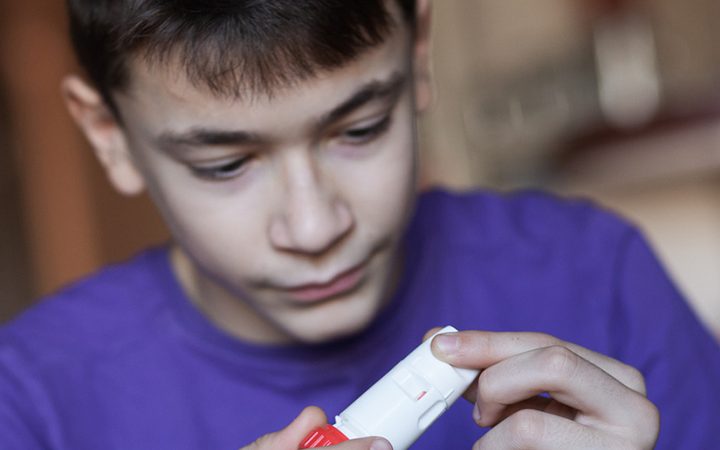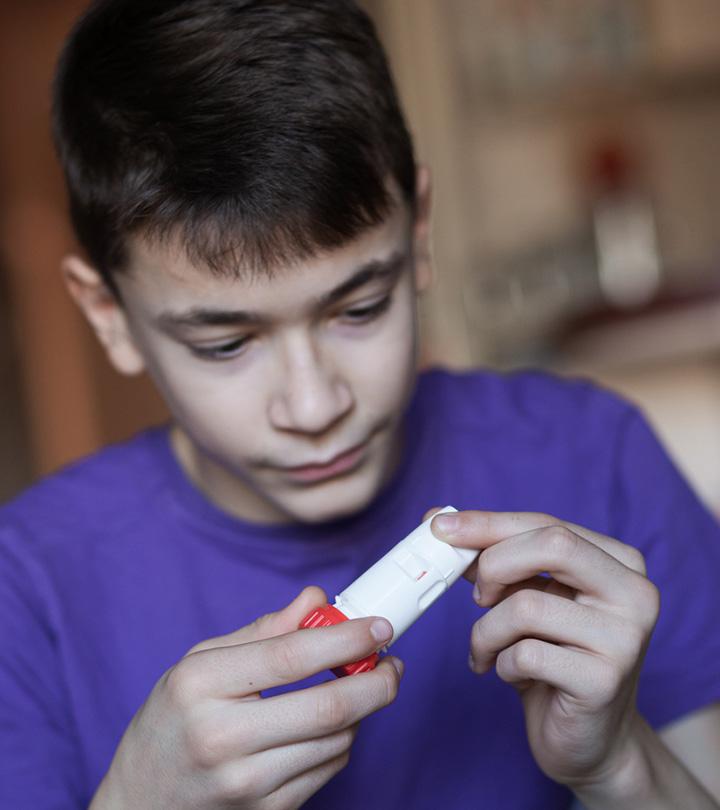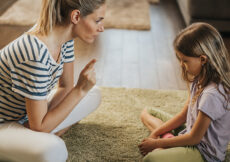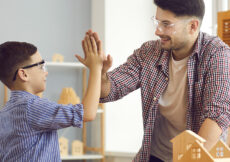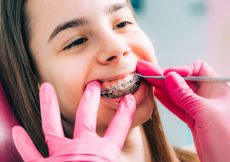Benadryl is a brand name for the antihistamine drug, Diphenhydramine. It is an over-the-counter medication (OTC) used for symptomatic relief from hay fever, allergies, or common cold. It may also be used to relieve motion sickness. Diphenhydramine provides only symptomatic relief and does not treat the root cause or hasten recovery (1).
This post discusses the safe use of Benadryl for kids, its side effects, and required precautions.
Is Benadryl Safe For Children?
Benadryl should be given to children only when prescribed by a licensed medical provider for a specific medical condition (2). Benadryl in appropriate dosage may be effectively used in relieving symptoms of several conditions, including allergies, in children. The dose of antihistamines for relief from allergies depends on the age and bodyweight of children.
You may follow dosage instructions as per package inserts, but it is advisable to consult a pediatrician before giving Benadryl to your child. Do not use Benadryl or other antihistamines as a sedative (induce sleep) in infants or children below 12 years of age (3).
What Are The Uses Of Benadryl For Children?
Benadryl or Diphenhydramine mainly works by inhibiting the histamine (H1) receptors in the body. This decreases the action of histamine, a chemical found in some of the body’s cells and responsible for many symptoms of allergies. It can also reduce the functions of the neurotransmitter acetylcholine (4).
Children’s Benadryl is meant to provide temporary relief from symptoms due to hay fever or other respiratory allergies such as runny nose, sneezing, itchy or watery eyes, itchy throat, nasal allergies, and hives (5) (6). Some of the other uses include the following (7).
- Relief from skin allergy symptoms in conditions such as eczema and poison ivy allergy (contact dermatitis)
- Relieve and prevent nausea and vomiting due to motion sickness.
Children’s Benadryl Allergy Plus Congestion contains an additional drug, Phenylephrine. It mimics the action of the neurotransmitter epinephrine (adrenaline) to additionally ease nasal congestion (stuffy nose) (8) (9).
What Is The Dosage Of Benadryl For Children?
Benadryl for children is available as chewable tablets and liquids. Do not use Benadryl in children below 12 months of age. Use only when instructed by a doctor for children below six years of age (10).
The table below summarizes the dosage information of various OTC Benadryl products for children. Each tablet or 5ml liquid contains 12.5mg active ingredient, Diphenhydramine HCl, as per the manufacturer’s product description (11).
| Benadryl product | Age 6-11 years | Age 12 years and above |
|---|---|---|
| Children’s Benadryl Dye-Free Allergy Liquid | 1-2 tsp (5-10ml) | – |
| Children’s Benadryl Allergy Liquid | 1-2 tsp (5-10ml) | – |
| Children’s Benadryl Allergy Plus Congestion | 1 tsp (5ml) | – |
| Children’s Benadryl Allergy Chewables | 1-2 tablets (12.5 mg to 25 mg) | 2-4 tablets (25 mg to 50 mg) |
These medicines should not be administered to children below six years of age without doctor consultation. The dose for each product may be repeated every four to six hours to a maximum of six doses in 24 hours or preferably as directed by a doctor.
Benadryl formulations for adults (each tablet or 5ml liquid contains 25mg Diphenhydramine HCl) come with instructions for use in children as well. However, it is advisable to opt for the products meant specfically for children to avoid any accidental overdose.
What Are The Side Effects Of Benadryl In Children?
Benadryl may cause side effects due to its action on histamine and acetylcholine receptors in the body, especially in the brain and intestine. Common side effects include (1) (4):
- Drowsiness or sleepiness
- Dizziness
- Dryness in mouth, throat, or nasal passage
- Loss of appetite
- Constipation
- Nausea
- Vomiting
- Increased chest congestion
- Headache
- Weakness in muscles
- Nervousness
- Excitement
Inform your doctor if these side effects do not go away on their own or become severe. Serious side effects that could require immediate medical attention include:
- Signs of allergic reactions such as hives, troubled breathing, or swelling of face, lips, tongue, and throat
- Pain or difficulty while urinating
- Heart problems such as irregular heartbeat
What Are The Signs Of Benadryl Overdose?
Overdose of Benadryl could lead to the following side effects, which may often be fatal (4) (12).
- Psychological disturbances such as confusion, hallucination, agitation
- Uncoordinated movements or shaking of body parts (tremor)
- Seizures
- Flushed skin
- Fever
- Dilated pupils and blurry vision
- Tachycardia (increased heart rate)
- Coma
Seek immediate medical care if you notice any of these symptoms or any other abnormal behavior in your child after Benadryl overdose.
What Are The Precautions To Be Taken When Using Benadryl?
You need to take certain precautions when using Benadryl in children to minimize harm from side effects (13).
- Ask a doctor before giving Benadryl if your child has a breathing problem (chronic bronchitis), glaucoma, or a sodium-restricted diet (Benadryl contains sodium).
- Inform your child’s healthcare provider about any other medication you are giving your child before starting Benadryl.
- Make sure your child takes the Benadryl products meant for children and not for adults.
- Read product labels to ensure your child is not allergic to any inactive substances in the product (citric acid, carboxymethylcellulose sodium, flavors, glycerin, saccharin sodium, sodium benzoate, sodium citrate, sorbitol, disodium edetate, sucralose, crospovidone, magnesium stearate, sodium chloride).
- Do not use antihistamine drugs as sleeping agents in children.
- Use dosage as per instructions on package insert. It is advisable to consult a pediatrician before giving Benadryl to ensure the proper dose of Diphenhydramine for your child.
- Do not continue giving the medication longer than specified by the doctor.
- Benadryl makes your child sleepy. Therefore, the child must refrain from activities that require alertness, such as sports or bike riding, when taking Benadryl.
- Check labels when taking other OTC products for your child to avoid those containing Diphenhydramine.
- Discuss with your child’s healthcare provider if you notice any signs of adverse effects.
- Keep the medication out of children’s reach. An accidental overdose could be fatal.
Benadryl provides effective symptomatic relief in allergic reactions, including food allergies and seasonal allergies, when used under medical guidance. The second-generation OTC antihistamines such as Cetirizine (Zyrtec), Loratadine (Claritin), and Fexofenadine (Allegra) have longer-lasting effects and cause less drowsiness and other side effects. These may be considered as alternatives to Benadryl for your child (14) (15). However, consult a pediatrician to know what best suits your child’s health requirements.
References:
MomJunction’s articles are written after analyzing the research works of expert authors and institutions. Our references consist of resources established by authorities in their respective fields. You can learn more about the authenticity of the information we present in our editorial policy.
The following two tabs change content below.


